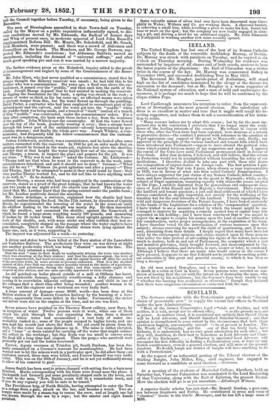IRELAND.
The United Kingdom has lost one of the best of its Roman Catholic subjects by the death of the venerable Archbishop Murray, of Dublin. Dr. Murray was struck with paralysis on Tuesday, and he expired at six o'clock on Thursday morning. During Wednesday his residence was surrounded by inquirers of all classes and of both creeds, anxious to hear the latest reports of the physicians : the Earl of Clarendon was a visitor twice in the course of the day. Dr. Murray was consecrated Bishop in November 1809, and succeeded Archbishop Troy in May 1823. The Reverend Mr. Meagher, parish-priest of Rathmines, will stand high on the list of candidates nominated by the clergy of the diocese for succession to the deceased; but as Mr. Meagher is a warm supporter of the National system of education, and a man of mild and unobtrusive de- meanour, it is perhaps too much to hope that he will be confirmed by the clique-ridden Pope.
Lord Castlereagh announces his intention to retire from the represent- ation of Downshire at the next general election. His valedictory ad- dress is so excellent in matter and tone that it might well recall his de- serting supporters, and induce them to ask a reconsideration of his inten- tion to retire.
"Mossy reasons induce me to adopt this course ; but by far the most im- portant one is the conviction I entertain that I no longer enjoy the confi- dence of the leading interests of the county. My refusal to concur with those who after the Corn-laws had been repealed, were desirous of a return to protective duties—the conduct I pursued with reference to the question of Papal aggression—my support of the grant to Mayuooth—and, finally' my approval of the principle of the various landlord and tenant bills which have been introduced into Parliament—appear to have altered the political rela- tions which existed between many of my supporters and myself. I opposed the repeal of the Corn-laws until Parliament pronounced itself in favour of Free-trade. After that decision, I believed, and still believe, that the return to Protection would not be accomplished without hazarding the safety of our institutions. I therefore decline to take any part with those who desire the reimposition of import-duties on foreign corn. The first petition I pre- sented, and nearly the first vote I gave, when chosen as your representative in 1826, was in favour of what was then called Catholic Emancipation. I have always supported the just claims of my Roman Catholic fellow country- men, and have therefore acquiesced in the grant to Maynooth; while, on the subject of Papal aggression resenting equally with others the course adopted by theRope, I entirely dissented from the proceedings and subsequent mea- sures of Lord John Russell and her Majesty's Government. There remains the landlord and tenant question ; a just and final settlement of which I have always codsidered as deeply important, not merely for the wellbeing of the tenantry but for the real mterests of the landlord. Utterly repudiating the wild and dangerous doctrines of the Tenant League, I have looked anxiously to the hands of the Legislature for a solution of the compensation' question. I have wished to see a measure carried by which the tenant might be en- couraged to improve by acquiring a remedy against loss of capital bona fide expended on his holding ; and I have been convinced that it was unjust to expect the occupier to employ his money upon the land of another without a fair consideration, under proper arrangements, at the expiration of his lease. I have therefore voted for the introduction of various measures upon this subject ; always reserving for myself the right of questioning, and, if neces- sary, dissenting from their details. I deeply regret that many have been led away by the extravagant opinions and claims insisted upon by those persons who under the false pretext of advocating the rights of the tenant, have done much to destroy, both in and out of Parliament, the sympathy which a just and manifest grievance, fairly brought forward, and unaccompanied by cla- mour, misrepresentation, and invective, is sure, sooner or later, to command. Although I believe that there are many who would concur in the course I have pursued, it appears to me that I should not be justified in exciting politi- cal animosities in this great and peaceful county, to which it has been so long a stranger."
An old man named Donoghue, and a boy his son, have been burnt to death in a cabin at Cool in Kerry. Seven persons were arrested on sus- picion of having fired the cot with the intention of destroying the man, who was not liked by his neighbours; but the Coroner's Jury were unable to say "whether the burning was accidental or otherwise," though they declared that there were suspicious circumstances connected with the case.


























 Previous page
Previous page